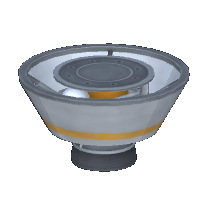Difference between revisions of "48-7S "Spark" Liquid Fuel Engine"
From Kerbal Space Program Wiki
(clean up formatting) |
|||
| Line 4: | Line 4: | ||
== Usage == | == Usage == | ||
| − | Like the 24-77, LV-1, and LV-1R, the 48-7S is intended to propel probes and small crewed craft. Due to its relatively high Isp and thrust to weight ratio, the 48-7S is remarkably capable in ascent, transfer, and lander roles. It also has thrust vectoring, unlike its radially attached counterpart,the Rockomax 24-77, allowing for greater control. | + | Like the 24-77, LV-1, and LV-1R, the 48-7S is intended to propel probes and small crewed craft, using light weight command pods and small fuel tanks large amounts of delta v can be achieved with little mass. Due to its relatively high Isp and thrust to weight ratio, the 48-7S is remarkably capable in ascent, transfer, and lander roles. It also has thrust vectoring, unlike its radially attached counterpart,the Rockomax 24-77, allowing for greater control. |
== Description == | == Description == | ||
Revision as of 16:37, 7 July 2014
| 48-7S "Spark" Liquid Fuel Engine | ||
| Liquid fuel engine by Rockomax Conglomerate | ||
| Radial size | Tiny | |
| Cost | (total) | 240.00 |
| Mass | (total) | 0.130 t |
| Drag | 0.2 | |
| Max. Temp. | 2000 K | |
| Impact Tolerance | 7 m/s | |
| Research | | |
| Unlock cost | 2 800 | |
| Since version | 0.21 | |
| Part configuration | liquidEngine48-7S_v2.cfg | |
| Maximum thrust | (1 atm) | 16.56 kN |
| (vacuum) | 20.00 kN | |
| Isp | (1 atm) | 265 s |
| (vacuum) | 320 s | |
| Fuel consumption | 1.27 | |
| Thrust vectoring | 3 ° | |
| Testing Environments | ||
| On the surface | Yes | |
| In the ocean | Yes | |
| On the launchpad | Yes | |
| In the atmosphere | Yes | |
| Sub-orbital | Yes | |
| In an orbit | Yes | |
| On an escape | Yes | |
| Docked | No | |
| Test by staging | Yes | |
| Manually testable | Yes | |
| Packed volume | 140 l | |
Originally from the KSPX parts mod, the Rockomax 48-7S is the non radial version of the Rockomax 24-77.
Usage
Like the 24-77, LV-1, and LV-1R, the 48-7S is intended to propel probes and small crewed craft, using light weight command pods and small fuel tanks large amounts of delta v can be achieved with little mass. Due to its relatively high Isp and thrust to weight ratio, the 48-7S is remarkably capable in ascent, transfer, and lander roles. It also has thrust vectoring, unlike its radially attached counterpart,the Rockomax 24-77, allowing for greater control.
Description
| “ | A cousin of the 24-77, the 48-7S is a stack mounted probe engine that packs quite a punch. — Rockomax Conglomerate |
” |
Changes
- Thrust increased from 20 to 30 kN.
- Initial release
